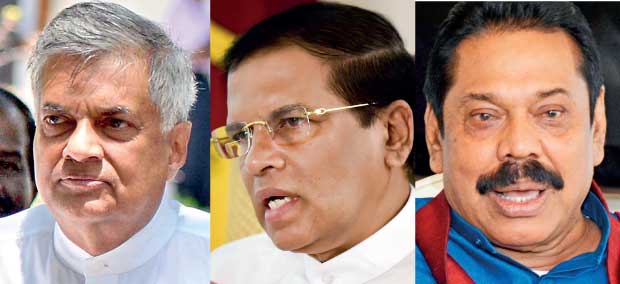Collateral damages of a breakdown of the coalition unthinkable
Posted on February 6th, 2018
Courtesy The Daily Mirror
I’ll be your mess, you be mine.
That was the deal that we had signed”
~ Gayle Forman
- Some UNP parliamentarians to go into a totally different gear and attack the President openly
- Bond scam report: President chose to express some opinion without referring such opinion to PM
- Collateral damages the Govt. would have to tackle after polls loom large
- Both the President, PM are being tested, not by voters; but more so by the circumstances
 Election platforms can turn men into super heroes; they can turn politicians into inspiring leaders; they can drive audiences into enraged mobs; they can also turn themselves into caricatures of comical proportions, from which empty rhetoric might resonate for a short time. Some of the rhetoric, like that of Martin Luther King Jr., John Kennedy, Mahatma Gandhi, Jawaharlal Nehru and Nelson Mandela in our recent memory and the Ciceros and Mark Anthonies of the ancient world, will echo for ages to come. But the results of those same elections will eventually turn these modalities into more realistic and rational outcomes. These outcomes will eventually tell the wise from the morons; the effective from the lazy and the great from the mediocre. These outcome may have a direct impact on the subject people whom the decision makers are supposed to preside over.
Election platforms can turn men into super heroes; they can turn politicians into inspiring leaders; they can drive audiences into enraged mobs; they can also turn themselves into caricatures of comical proportions, from which empty rhetoric might resonate for a short time. Some of the rhetoric, like that of Martin Luther King Jr., John Kennedy, Mahatma Gandhi, Jawaharlal Nehru and Nelson Mandela in our recent memory and the Ciceros and Mark Anthonies of the ancient world, will echo for ages to come. But the results of those same elections will eventually turn these modalities into more realistic and rational outcomes. These outcomes will eventually tell the wise from the morons; the effective from the lazy and the great from the mediocre. These outcome may have a direct impact on the subject people whom the decision makers are supposed to preside over.

Set against such a directly-relatable context, when one examines the various statements emanating from today’s election platforms, one would wonder as to what type of government has been in power since January 15, 2015. A confrontational political dynamic that has been set in motion by President Sirisena has left many a supporter of the coalition between firstly Maithripala Sirisena and Ranil Wickremesinghe and secondly the two leading political rival parties, the United National Party (UNP) and Sri Lanka Freedom Party (SLFP), aghast and dumbfounded. Two weeks before a much-publicized and overly-hyped election campaign, what President Sirisena put in process was a calculated political gamble. In that venture, in terms of the President’s calculations, apart from the direct effect the venture would bear on the electorate, there would be some stirring collateral damage that would follow the process of this confrontational dynamic he has set in.
The direct damage will include, among others, a crack in the coalition, especially between the two leaders, Ranil Wickremesinghe and himself. That major repercussion would eventually entail a cascade of obstacles being erected between the two parties at every level. Starting at the Cabinet level and going down to Parliament, this widening of the crack might even lead to open confrontations between the lower level MPs as was seen last week. In an extremely politicized climate as is seen in Sri Lanka today, a local government election cannot go unnoticed and its results are now becoming relevant as some pundits have opined during the last couple of weeks.
Two weeks before a much-publicized and overly-hyped election campaign, what President Sirisena put in process was a calculated political gamble
To bring local government election issues onto the national platform and make it a wide and national referendum on the central administration can be dangerous and sometimes seem silly and utterly amateurish. Local government elections, which usually are exclusively centred on local issues and the credentials of local candidates, have been brought to the national stage and the mush-maligned issue of the so-called Bond-scam is featuring predominantly on that stage, thanks mainly to the Joint Opposition (JO).
Nevertheless, the question remains whether the Bond-scam, which the JO seems to be centring their election campaign on, is an issue among the rural voters when they go to the polls on February 10. Historically all local government elections are decided on one single issue. Whether the continuation of the same party at the centre would or would not help the voters has been the primary question in the minds of the voters. In an electorate so attuned to vituperative political innuendo, the Bond-scam could easily occupy a significant echelon and it gathered tremendous momentum when the full Report came out, at least to the eyes of the President. He chose to express some opinion without referring such opinion to the Prime Minister. Although such reference was neither required nor mandatory, it was, at least in the minds of top UNP leaders, a necessary step President Sirisena should have observed in the interests of the sustenance of the coalition government. If on the other hand, President Sirisena had any misgivings with the UNP and its Ministers, he would have had ample opportunity and time to discuss such misgivings with Prime Minister Ranil Wickremesinghe. However, that posture adopted by President Sirisena alone was sufficient to motivate some UNP parliamentarians to go into a totally different gear and attack the President openly- the same tactic Sirisena adopted.
When President Sirisena started attacking the UNP either vicariously or directly, the wounds that were festering beneath the outer skin started oozing. This gave rise to a sense of instability in the government ranks and the demeanour of the Prime Minister may have helped to calm the stormy clouds, yet how the voter is going to view in the context of the impending elections would be known only after the poll on February 10.
Among the collateral damages that the Government would have to tackle after the election are looming large. Among them is how each Pradeshiya Sabha or Municipal Council would form its Council in the event no single party gains an absolute majority to qualify for that number of winning candidates turning into Council members. That is one major issue that predominates. Such a departure from the agreed coexistence between the UNP and SLFP would cause many local issues that may drift around when the ‘big’ election approaches, come 2020.
Another collateral damage would be the attitude of each Minister in either camp would affect when coming to treating their constituents of the opposing party. Whenever a decision becomes pending on a major matter of policy, looking through the prism of party leaning of each government servant and each private sector would be-contractor or consultant, the tilt of the decision would obviously be expressed within the frame of party leanings. A marriage that was brought about to topple the corrupt Rajapaksa regime might well be in its last laps. Coexistence is difficult; it could be highly glorified at the beginning; it could be immensely helpful to bring about reconciliation between the supporters of each party. Yet an open confrontational stance is going to be condemned by the rank and file of both parties.
Historically all local government elections are decided on one single issue. Whether the continuation of the same party at the centre would or not help the voters has been the primary question in the minds of the voters
How can reconciliation be brought about in an atmosphere of such fundamentally opposite stances taken by the leaders of the two parties? It is always easy to criticize in hindsight. The greatness of great leaders is their ability to foresee such occurrences and have contingency plans to tackle such situations of disagreements. Both Maithripala Sirisena and Ranil Wickremesinghe are being tested, not by the voters but more so by the circumstances. Clever leaders would certainly know that the best approach to repair problems of coexistence is establishing direct communication without advisors and so-called consultants.
It’s extremely encouraging to know that such a meeting between the two protagonists took place during the last few days. Quite a relaxed and unpretentious meeting, as reported by the media, took place at the President’s residence and some mutually beneficial and agreeable terms have been arrived at. And the visible results of that meeting might have an unmitigated effect on the elections. Although it would be hard to predict that a strong and powerful political party like the Sri Lanka Freedom Party would be beaten to third place by a fly-by-night political entity such as SLPP whose leadership is that which was defeated by Maithripala Sirisena, the current leader of the SLFP.
Containing collateral damage looms much more difficult and large. In such a backdrop how can the two leaders of the parties and their respective support groups come back to trusting each other and continue a very arduous journey together? The glory and glamour of defeating of the Rajapaksas is a faint memory now. The people have moved on and the political leaders need to realize that the reality of politics is changing by the day. They have to move beyond sloganized politics and street fight-centred gerrymandering of electioneering.
The writer can be contacted at vishwamithra1984@gmail.com
 Enough is enough, the last UNP candidate to win a presidential election from UNP was late President Ranasinghe Premadasa and the last presidential election that UNP fielded its own candidate was 2005 where Mahinda Rajapaksa was elected defeating Ranil Wickremesinghe. However in the presidential polls in 2010 and 2015 the UNP did not put forward its own candidate but opted to support Sarath Fonseka and Maithripala Sirisena at the respective elections. But for the UNP voter it has been a long wait…
Enough is enough, the last UNP candidate to win a presidential election from UNP was late President Ranasinghe Premadasa and the last presidential election that UNP fielded its own candidate was 2005 where Mahinda Rajapaksa was elected defeating Ranil Wickremesinghe. However in the presidential polls in 2010 and 2015 the UNP did not put forward its own candidate but opted to support Sarath Fonseka and Maithripala Sirisena at the respective elections. But for the UNP voter it has been a long wait…
Many believe that the long wait has taken the UNP voter for granted, with which they may not be generous this time – come 2020.
Therefore, the Local government election on February 10th will be an acid test for the UNP, which is the main ruling party of the coalition government. It is a test to what the UNP has been able to deliver to the masses as promised during the last three years whether the party was able to keep up to its promises made prior to 2015 August polls, not forgetting the fact that these promises were given by the party under the leadership of its leader Prime Minister Ranil Wickremesinghe. Although this election will be determined by the local issues faced by the masses such as garbage collection, city traffic, keeping the cities clean etc. those who voted for the UNP at the last election will look at this as a report card to its achievements. Mainly those made under its current leader. Therefore the UNPer will look at its captain’s knock. The local election is a crucial test to premier Wickremesinghe where the masses would give him the report card for what he has done during the last three years.
The next test is for the incumbent president Maithripala Sirisena, as the SLFP is contesting under the symbol hand again after 1988. It’s a report card to the president for what he had promised to his SLFP VOTER at the last presidential poll though he contested as a common candidate.
However for the former president Mahinda Rajapaksa, it won’t be an acid test at all as constitutionally he cannot contest at a future presidential election and so he is ruled out from that fray.
Local government election on February 10th will be an acid test for the UNP, which is the main ruling party of the coalition government
So if he may think that he could still become the president it’s a total myth and a simple assumption of an overjoyed voter who is thus loyal to the Rajapaksas unless the constitution is once again amended and reverts to the 18th amendment.
Therefore power going back to Rajapaksa is an impossible thought.
Now it is learnt that those who are close to the former president are spreading that Mahinda Rajapaksa will be appointed the prime minister after the local government polls.
A person who has at least an inkling about the Sri Lankan political system will not even dream of such a situation as it cannot happen constitutionally because the local polls is not a national election. It is to find local rulers to the most micro geographical units of the political map in the country. Whoever wins that election will not get appointed to the second most prestigious post in this country but will get appointed only as a Mayor to a municipal council.
But the hypothetical assumption that some have is to make Rajapaksa’s party the ultimate victor in this local polls and create pressure and request the president to appoint MR as premier giving MR’s support to the president at least for the next two years.
But will President Sirisena be able to do that as he clearly rejected Rajapaksa’s re-entry? It is impossible that the president will have faith towards MR as the way the president attacks the Rajapaksa family at political platforms. Be that as it may the political analysts say the president providing Rajapaksa the breathing space is like him digging his own grave.
But as a democratic, one may have to remember that fact that president Sirisena would not have become the president if not for the overwhelming support of the UNPer who went in numbers to the polling booths on January 8 in 2015.
And betrayal of UNPers won’t be easy if someone has that gratitude.
February 6th, 2018 at 10:58 pm
IF UNP could win on its own there was NO REASON why they got My3 to contest. So the UNPers arguement is WRONG.
UNP votes would be WASTED if anyone else (other than My3) contested. There is NO prize for SECOND PLACE in a presidential election!!
Poor UNPers don’t understand that. My3 has done enough for UNP support by making useless RUN-NIL, Rvi, Mangala, etc. ministers. They messed it up.
Hope My3 will TAKEOVER the POLICE and FINANCE ministries tomorrow and GRILL BOTH MUDDY CROOKS.
Both elephant and lotus flower bud go to mud. They are both same as far as MUD goes.